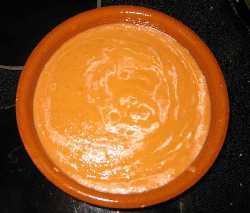Salmorejo
| Salmorejo | |
|---|---|
|
A bowl of Salmorejo | |
| Alternative names | Ardoria |
| Course | Appetiser |
| Place of origin | Spain |
| Region or state | Andalucia |
| Serving temperature | Cold |
| Main ingredients | Tomato, bread, oil, garlic and vinegar |
| Variations | Gazpacho |
|
| |
Salmorejo is a purée consisting of tomato and bread, originating from Cordoba in Andalucia, south Spain. It is made from tomatoes, bread, oil, garlic and vinegar. Normally, the tomatoes are skinned and then puréed with the other ingredients. The purée is served cold and may be garnished with diced Spanish serrano ham and diced hard-boiled eggs.[1]
Salmorejo is more pink-orange in appearance than gazpacho, and is also much thicker and creamier in texture, because it includes more bread. There are several variations in Andalusia, including ardoria and porra antequerana (with bits of tuna as topping).
Salmorejo is also the name given to a marinade typical of Canary Islands cuisine. It is used to flavour meat before cooking, especially rabbit (conejo en salmorejo) which is a speciality of the islands. Typical marinade ingredients include salt, garlic, paprika and hot peppers.
Sample recipe
Ingredients
To garnish
- diced Serrano ham
- hard-boiled egg
Method
Skin the tomatoes and remove their cores. Using a blender, liquefy the tomatoes and garlic and add the vinegar and seasoning. Soak the bread in water until tender, then wring it out. Next, add half of the bread and blend until smooth. Continue adding bread and a little olive oil and blending until the cream has a smooth, creamy consistency. Chill the purée and then serve in a shallow bowl, garnished with ham and egg and accompanied by fresh bread.
The combination of the acidity of the vinegar and tomatoes with the chilled temperature of the purée makes it very refreshing; natives prefer to enjoy it in the shade on a warm summer day.
See also
References
| Wikimedia Commons has media related to Salmorejo. |
- ↑ Teresa Barrenechea, Christopher Hirsheimer, Jeffrey Koehler, (2005), The cuisines of Spain: exploring regional home cooking, New York, Ten Speed Press, ISBN 1-58008-515-6, pag. 67
| |||||||||||||||||||||||||||||||||||||||||

